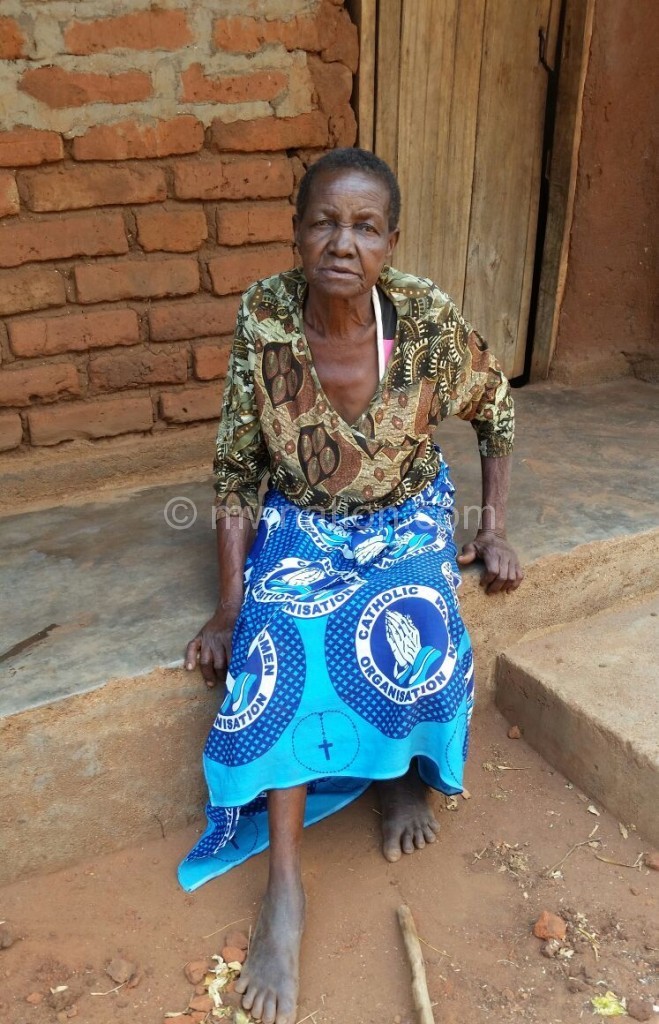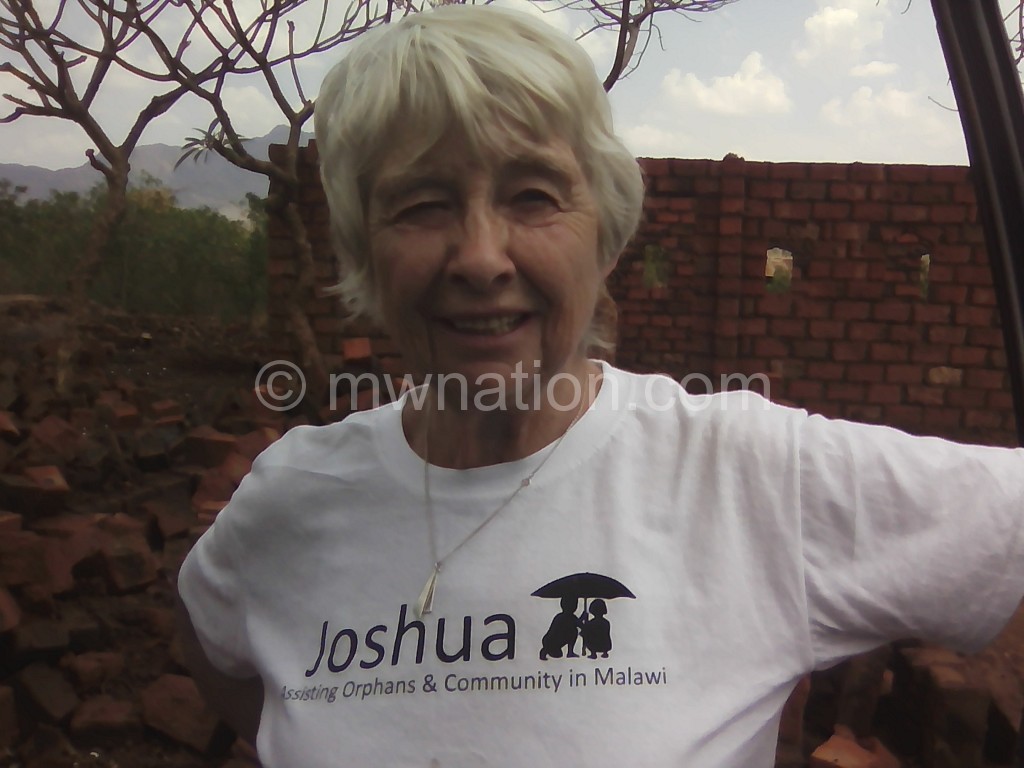‘Sins’ of growing old
It is Friday morning, she wakes up and sits on the veranda. A tear rolls down her cheek and few seconds later, the visibly highly emotional face is covered with tears.
Listening to her cry, 78 year old Theresa Chimimba from Ntantha village, Traditional Authority Kuntaja in Blantyre, grapples with how she will continue feeding her six grandchildren.
Apparently, the previous day, Chimimba and the kids had not eaten anything apart from maize flour porridge. Unfortunately, that was the last drop of flour in the house.
“All the flour is finished and I don’t know what to do next. We will just be drinking water and eating mangoes which are not even ripe,” complains Chimimba.
The six grandchildren, who go to Chigumukire Demonstration primary school—about three kilometres from her home, are aged between six and eight years. Their parents cannot be traced, and Chimimba is their only answer.
“I have nothing to prepare for them. We have been taking porridge for a long time and there is no more flour,” she says.
But how does she survive?
Chimimba says she does piece-works and says she is mostly paid K100 (0.18) or even as little as K50 ($0.09) after toiling.
“I work in people’s farms where sometimes I am paid K50 or K100. When paid, I buy maize flour and relish,” she adds.
With grandchildren who are below eight years, Chimimba has to cook, and do most of the household chores, including drawing water from a nearby borehole.
The kids cannot even support her in piece-works.
Worse still, Chimimba has swollen legs and three years ago, she was operated on at Queen Elizabeth Central Hospital (QECH).
The problem has resurfaced and she requires immediate medical attention.
“My legs no longer support me. I can’t walk a long distance or without a stick. You see (pointing at her legs), I went to a mission hospital here but they just gave me Panado and nothing is changing.
She sadly adds: “I want a full scan, and the mission hospital does not have equipment for scanning which means I need to go elsewhere. The last time I went to the mission hospital I paid K3000 [$5.28]. This was the only money I had now I have nothing more for food or medication.”
During the January devastating floods, Chimimba’s house fell on one side, and the Catholic Church in the area is rebuilding that part. However, the house has several cracks and any heavy rains may heavily affect it.
The only solace she has is that the six children take porridge at school under the School Feeding Programme everyday and once every month at a nearby Joshua Orphan and Community Care’s Kitty Club.
Group Village Headman (GVH) Solomoni under whose jurisdiction Ntantha village falls, acknowledged the problems Chimimba faces.
“I have about 50 old men and women in my area and most of them lack nutritious food, shelter, care and clothes.
“But Chimimba’s case requires special attention. I visit her most of the times, but well-wishers must quickly come in with help,” he said.
Solomoni says Chimimba has a one-acre land, but there is no one to help her. He also wonders how her children decided to abandon her.
“I implore Non-Governmental Organisations (NGOs) to help government in situations like this. Chimimba needs urgent attention,” he said.
At the Kitty Club, older men and women meet once every month to share experiences, jokes and remind each other of their youthful days. They are also given food.
Chimimba’s case is a wakeup call that a lot need to be done to the elderly, according to Lusungu Ngulube, Country Manager for Joshua Orphan and Community Care (Joshua Organistion).
“We will need to engage an extra gear. Chimimba has no support and sometimes when we ask the Village Development Committees (VDCs) to provide us with names of people that need support, they leave out people that are very needy like her,” he says.
“She needs some clothes, good shelter and nutritious food. We are currently building houses for those that were affected by floods at Chilaweni in Blantyre, but we will need to see how best we can support Chimimba,” Ngulube said.
Lusungu also promises to instruct the organisation’s nurse to check on Chimimba during monthly clinics so that her health situation is determined.
The organisation has eleven clubs with an average of 45 elderly persons per club, who are sometimes given clothes and food items, apart from the monthly meal.
The 2014 HelpAge International ranked Malawi among the 10 worst countries to grow old in Africa. It measures income security, health and whether someone has access to public transport, social connections as well as their physical safety.
In the report, Malawi was ranked among the lowest on the enabling environment domain for the elderly.
In its September 2015 Report on Ageing and Health, the World Health Organisation (WHO) called on governments to come up with comprehensive public-health actions on ageing.
“Four priority areas for action can be identified: aligning health systems with the needs of the older populations they now serve; developing systems for providing long-term care; creating age-friendly environments; improving measurement, monitoring and understanding,” urges the report.
Sylvia Avgherinos, executive director for Joshua Organisation, says government should take such advice seriously and care for the elderly.
The 71 year old Avgherinos notes that the elderly are mostly neglected, further observing that much support is channelled to orphans who are, ironically, brought up by the elderly.
“People have to grow old with dignity, they don’t have to suffer indignity. These are custodians of various cultures and need support.”
Secretary for Gender, Children, Disability and Social Welfare, Dr Mary Shaba says Chimimba needs to be assisted under the Social Cash Transfer Scheme which is yet to reach Blantyre.
Shaba says Blantyre is among 10 districts that are waiting for phase three of the Scheme.
“Phase three of the scheme will roll-out immediately funds are available. Currently we are negotiating with government and development partners on resources.”
She says Chimimba would easily be assisted with her grandchildren, adding that her needs satisfy the criteria used when selecting beneficiaries for the scheme.
According to Shaba, a Cabinet Committee on Social Development has also adopted the draft National Policy for the Elderly Persons, and will soon be sent to the full Cabinet.
On October 1 every year, countries world over celebrate the International Day of Older Persons to recognize the contributions of older persons and to examine issues that affect their lives.
However, the celebrations did not take place in the country on October 1,”because people were busy” according to Shaba.
Meanwhile, Shaba has said the celebrations will take place later this month.
Just like South Africa’s Archbishop Desmond Tutu once said “As we get older, our rights do not change. As we get older, we are no less human and should not become invisible”, Chimimba has one request;
“Mukandiuzireko a boma kuti ndupempha chithandizo, kukalambatu kusakhale chilango. [Please tell government on my behalf, I need help. Growing old must not be a punishment.”






